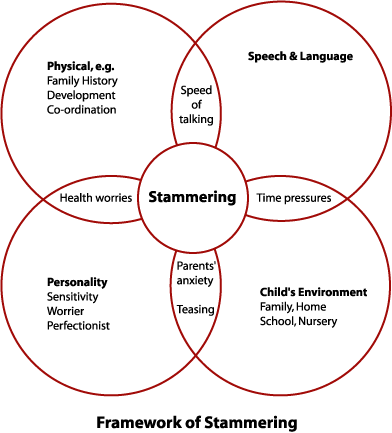Stuttering and Stammering
When I was a University student, many moons ago, I lived in a flat downstairs from a fellow student; a young man called Rowan who was studying engineering. On the face of it, he had alot going for him; smoldering dark looks, brains, sporty. the son of a surgeon. Everything would have been great if only he hadn't opened his mouth, because when he did, it was painful...very, very painful.
Rowan had a severe stutter(some call it a stammer) and with every word he spoke, he seemed to be fighting some sort of intense internal struggle: ssss ssss ssss...sssss...soooometimes, the struggle would be so great it would seem like an eternity before the word finally appeared. For the listener the temptation was to finish the word for him but he hated that.
As I got to know Rowan I noticed that his stammering eased a little when comfortable with familiar people but that when faced with new social situations it would get worse. It seemed the more stressed and anxious he felt, the worse his speech became. Before we became friends I knew very little about speech impediments - he explained to me that he believed his stuttering was entirely psychological and that there was no physical cause for it at all. I was amazed at this and wondered why he couldn't just "shake it off" but it seemed, for whatever reason, he couldn't. Rowan didn't know why he stuttered but it it had been with him for a long time. Eventually we lost touch but I sometimes thought about him and wondered if he ever managed to free himself from his stutter.

The Burden of Stuttering
A severe stutter can be terrible burden - the sufferer may avoid certain words in conversation and/or may avoid certain situations altogether if they feel they will be put under stress. This can limit their life experience and potential for interaction and relationships.
The inability to conduct fluent, flowing speech without having to consciously think about it, is taken for granted by most people, yet for the stutterer they are almost always conscious of the act of speech, especially in certain situations. Of course stuttering can range form a mild 'tripping up' on certain words and barely noticable, to a full blown speech disability.
What Causes Stuttering?
The condition normally begins in early childhood and is considered a developmental problem and while the general consensus had in the past been that there is no physical cause, more recnet research suggests otherwise. Specialists are also quick to point out that it is not caused by emotional or mental problems, though these can certainly arise as a result of the stutter.
When, as infants, we first beigin to speak, stuttering is quite common and part of the normal learning process of speech. Usually as we become more familiar with using language, we grow out the stuttering phase; a few however, will not.
A Few Facts about Stuttering
- Approximately three million Americans suffer from significant stuttering
- The symptoms of stutttering can vary in an individual throughout the day, depending on situation.
- Boys are twice as likely to stutter as girls, however the gap increases with age. In adulthood boy stutterers outnumber girls as much as three or four times.
- Stuttering most often occurs in children aged from two to five
- Developmental stuttering runs in families
- 'Neurogenic' stuttering may occur after a brain injury
Left Brain Issues
A 2002 study by Dr Martin Sommer and colleagues from Hamburg and Göttingen Universities, conducted a test using magnetic resonance imaging to assess the brain tissue structure of stutterers and compared it with a control group of people with normal speech. The reserachers discovered that there were significant differences in the tissues of left brain hemispheres of the stutterers and in particular, in areas related to articulation and the forward planning of speech. According to the researchers:
"This abnormality probably develops during the period of early language and speech acquisition in which many children experience a transient phase of stuttering. Our methods could be used to ascertain why certain children develop persistent stuttering, whereas others become fluent speakers."
Genetic Component
In 2010, scientists were able to isolate three genes that cause stuttering and researchers estimate that these mutations account for about 9 percent of stuttering cases. This means that a certain proportion of the population will be predisposed to stuttering.
All this would seem to suggest that my friend Rowan had been wrong about there being no physical cause for his speech difficulties. It may be that stuttering or stammering (they mean the same thing) is caused by a combination of factors. The Association for Research into Stammering for Children provides a graphic, demonstrating the "multfactoial" nature of stuttering.

Getting Help
Whatever the exact nature of the cause, specialists advise that dealing with a speech problem before a child starts school, increases their chances of overcoming the problem. However, adults can also greatly benefit form therapy with a trained specialist. While there is no actual 'cure' for stuttering, there are certainly beneficial treatments and strategies which can control the impediment.
If you are the parent of a child who stutters, it's important not to react negatively, as this my increase stress and compound the problem.
- Selective Mutism in Children
Selective mutism is a strange disorder that usually first manifests itself in early childhood. The suffererer is perfectly physically capable of speech but owing to severe shyness and social anxiety, is unable...



